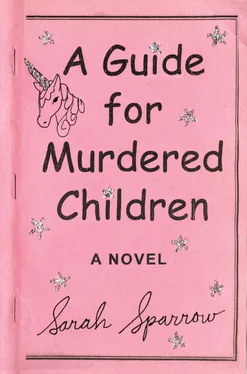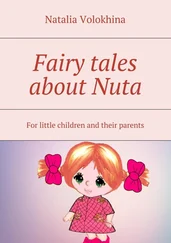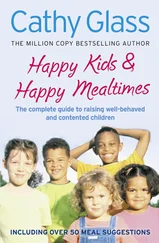Sarah Sparrow - A Guide for Murdered Children
Здесь есть возможность читать онлайн «Sarah Sparrow - A Guide for Murdered Children» весь текст электронной книги совершенно бесплатно (целиком полную версию без сокращений). В некоторых случаях можно слушать аудио, скачать через торрент в формате fb2 и присутствует краткое содержание. Город: New York, Год выпуска: 2018, ISBN: 2018, Издательство: Blue Rider Press, Жанр: Фэнтези, Триллер, Детектив, на английском языке. Описание произведения, (предисловие) а так же отзывы посетителей доступны на портале библиотеки ЛибКат.
- Название:A Guide for Murdered Children
- Автор:
- Издательство:Blue Rider Press
- Жанр:
- Год:2018
- Город:New York
- ISBN:978-0-399-57452-8
- Рейтинг книги:5 / 5. Голосов: 1
-
Избранное:Добавить в избранное
- Отзывы:
-
Ваша оценка:
- 100
- 1
- 2
- 3
- 4
- 5
A Guide for Murdered Children: краткое содержание, описание и аннотация
Предлагаем к чтению аннотацию, описание, краткое содержание или предисловие (зависит от того, что написал сам автор книги «A Guide for Murdered Children»). Если вы не нашли необходимую информацию о книге — напишите в комментариях, мы постараемся отыскать её.
A Guide for Murdered Children — читать онлайн бесплатно полную книгу (весь текст) целиком
Ниже представлен текст книги, разбитый по страницам. Система сохранения места последней прочитанной страницы, позволяет с удобством читать онлайн бесплатно книгу «A Guide for Murdered Children», без необходимости каждый раз заново искать на чём Вы остановились. Поставьте закладку, и сможете в любой момент перейти на страницу, на которой закончили чтение.
Интервал:
Закладка:
“I’m so sorry,” he said.
He felt a measure of shame, because the panic of abandonment that seized him at the prospect of her leaving him had temporarily eclipsed any feelings of empathy about her condition.
“You said you were asking yourself questions, Annie… what sort of questions?”
“I probably shouldn’t say—you’re too new, and it isn’t right to burden you…” Her need to confide overruled the hesitation. “My children have never failed to achieve the moment of balance —but lately I’ve caught myself wondering, ‘What happens if they don’t?’ What if they fail in their task of finding the ones who killed them? And what if the landlords—the bodies they’ve borrowed—are destroyed before they’re able to assist them? If they’re struck by an automobile or somehow disabled—which has never happened and in itself is unthinkable! It’s a loss of faith I tell you… a Pandora’s box of What ifs has blown open and hard as I try I cannot slam it shut… What if those who return confront their murderers, but the moment of balance somehow gets botched—and they’re murdered again by the very one who once destroyed them? Is or isn’t that a possibility, Willow?” She literally shook in distress and he couldn’t discern if she expected him to answer. “And larger questions come, that aren’t even germane. For example, are children the only ones who seek moments of balance ? Why wouldn’t everyone who’d ever been murdered do the same? And if that were true, it would stand to reason that Meetings are being held throughout the world”—she was hysterical now—“thousands and thousands and thousands of them! When I asked my mentor, he said that may well be true but that it wasn’t my concern… which it isn’t! Because we’re meant to deal only with that which is in front of us, Willow; to ask for more is egotism, arrogance, faithlessness. But I have begun to reconsider all these things, I can’t help myself!—can’t sleep at night—worlds of Meetings I can never attend or know of, as if any of it makes a difference! These questions, these doubts are merely a symptom of ‘haywire,’ can you see? My mind is cluttered and disordered… Just this morning I was wondering: If my children don’t complete their tasks, then what happens? Do those responsible for their deaths get away scot-free? That would be so unfair! Yet the very idea of ‘fairness’ is a notion of our world, not theirs, not the world of mystery—or is it? Can you see the quandary? I’ve even begun to question the moment of balance itself… because in the end, isn’t the whole notion of ‘getting away with’ or ‘not getting away with’ murder a meaningless thing? Mystery cannot be fair, Willow, mystery just is . Mystery isn’t meant for such a crude concept as fairness… and yet— what will happen to the children? What will happen to them if they don’t succeed? Will they be in limbo? Or is ‘limbo’ just another crude and meaningless concept, a concept of this world… I tell you, it haunts me! I am haunted just like the mothers who lost their murdered babies…”
Annie went on to say that if she failed at her duties, she’d be killing her wards as surely as those who had slayed them. Then she calmed herself, apologizing for the outburst.
“Not a wonderful way to pass the torch to a new Porter,” she said. She poured her tea with an unsteady hand, took a deep breath and smiled. Worry returned, furrowing her brow. This time it was as if she were thinking out loud. “And there’s a girl who’s far too young. Adolescents are never landlords, they’re too unstable to effect the moment of balance —too many hormones. And this one’s unstable by nature…”
“Okay,” nodded Willow, numb and overwhelmed. It was another way of saying that’s enough now.
“There’s only one thing I seem to know—just one thing.”
“What’s that, Annie?”
“It’s time that you be properly introduced.”
She closed her eyes and a charming little smile played across her face.
“It’s time for you to meet the children.”
DYSPHORIA
1.
Dr. Jacqueline Robart’s supervisor told her about the girl. Jacquie was his go-to when it came to troubled teens.
Because of a genetic condition (and resultant physical deformities), Renée “Honeychile” Devonshire had played adoption roulette longer than most. Three years ago, Hildy Collins finally found her a home. Jacquie had profound respect for the woman whom professionals in the field called “the adoption whisperer.” She was a legend, routinely placing kids thought to be hopeless, violent or mentally ill in environments where they blossomed. Renée, a member of “Hildy’s Girl Squad,” had apparently done very well—until now.
Jacquie met with her parents while the client waited in the anteroom. From what the shrink could see, Harold and Rayanne were a warm, loving, somewhat overprotective couple who’d become concerned with their daughter’s erratic behavior. They spent the first five minutes kvelling over how smart and funny Renée was and how well she’d done in school, considering her special challenges. Her lisp, short stature and overall appearance made her an easy target. “But lately,” said Rayanne, “everything has changed.” She was often reported as truant and sometimes didn’t come home for supper. She’d been a straight-A student, but three of her teachers told the Devonshires they might have to fail her. Rayanne said she had a heart-to-heart with Zelda, one of Renée’s closest friends, who confided that she too was “worried sick.” The therapist was glad to hear Renée still had a friend, which bode well in its small way. By the time kids wound up in her office, they’d often left friends far behind or acquired new ones of the dangerous kind. The Devonshires insisted that drugs or boyfriends weren’t an issue, but Jacquie didn’t give their remarks much weight because it was common for parents to deny or downplay the experimental, sometimes criminal behavior of their kids. Children who’d been in the system as long as Renée were pretty genius when it came to concealing their inner and outer lives.
At the end of the interview, Jacquie walked them out. She smiled at Renée and shook her hand, inviting her in.
The office was friendly and inviting, announcing its “safe place” status by a few stage-managed accoutrements—a print of a Basquiat graffiti painting, a framed photo of Eminem (the therapist hadn’t found the time to replace him with a more up-to-date avatar), and a drawing of Jeffrey Tambor’s character from Transparent .
Renée was sullen and fidgety, like all the kids who came through the door.
“I’m Jacqueline. My friends call me Jacquie and you can too, if you like.”
“Okay.”
“I like either one. Your mom said everyone calls you Honeychile. I love that! Very Southern. Have you spent any time in the South?”
“No.”
“It’s pretty amazing. Especially New Orleans—for Mardi Gras. I think you’d love it. Is it all right to call you Honeychile? Or would you prefer Renée?”
“Whatever.”
“Then Honeychile it is,” she said with a smile. “How are you feeling?”
“About?”
Jacquie saw straight off that the girl was smart. Her native intelligence shone through. “About being here. Probably not the most fun thing you’re going to do all week. It can be kind of a drag at first.”
“At first? They said I only had to come once.”
“Fair enough. Then let’s make the most of our visit. Do you know why your mom and dad wanted you to come see me?”
Читать дальшеИнтервал:
Закладка:
Похожие книги на «A Guide for Murdered Children»
Представляем Вашему вниманию похожие книги на «A Guide for Murdered Children» списком для выбора. Мы отобрали схожую по названию и смыслу литературу в надежде предоставить читателям больше вариантов отыскать новые, интересные, ещё непрочитанные произведения.
Обсуждение, отзывы о книге «A Guide for Murdered Children» и просто собственные мнения читателей. Оставьте ваши комментарии, напишите, что Вы думаете о произведении, его смысле или главных героях. Укажите что конкретно понравилось, а что нет, и почему Вы так считаете.












